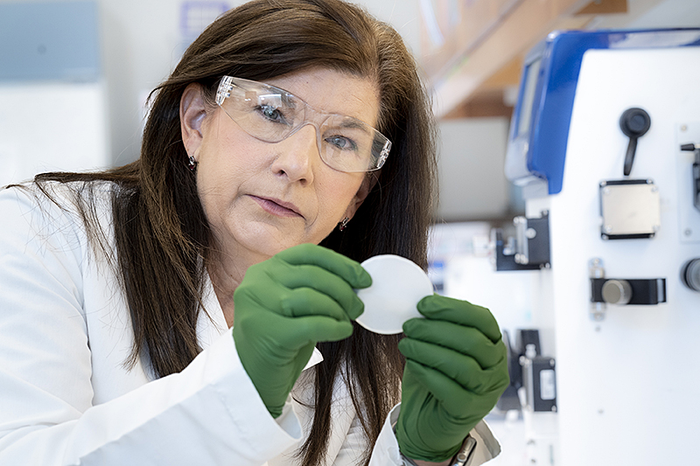WEST LAFAYETTE, Ind. — GeniPhys Inc., a life sciences company focused on developing and commercializing a proprietary biopolymer technology developed in Purdue University professor Sherry Harbin’s laboratory, has been awarded a two-year, $974,349 Small Business Innovation Research (SBIR) grant from the National Science Foundation.

Credit: None
WEST LAFAYETTE, Ind. — GeniPhys Inc., a life sciences company focused on developing and commercializing a proprietary biopolymer technology developed in Purdue University professor Sherry Harbin’s laboratory, has been awarded a two-year, $974,349 Small Business Innovation Research (SBIR) grant from the National Science Foundation.
The core technology, known as Collymer, is a novel polymerizable collagen molecule that can be used to custom-design and fabricate implantable materials to address unmet functional tissue restoration and reconstruction needs, including breast tissue, skeletal muscle, cartilage, skin, voice box and more. This Phase II grant will be used to advance the commercialization of the company’s initial product, Collymer Self Assembling Scaffold (Collymer SAS).
Collymer materials harness both the mechanical and biochemical signaling features of natural collagen found within tissues. This allows the materials to support regenerative and restorative healing without rapidly degrading and eliciting inflammation or foreign body responses. This mechanism of action has been validated in multiple preclinical proof-of-concept studies. Additionally, Collymer is highly customizable, allowing for the creation of materials with a variety of formats and mechanical properties.
GeniPhys was previously awarded a $225,000 NSF SBIR Phase I grant to perform preclinical testing to evaluate Collymer SAS prototypes for breast tissue restoration in a porcine lumpectomy model. Working collaboratively with members of Purdue’s Weldon School of Biomedical Engineering, Purdue’s College of Veterinary Medicine and Indiana University School of Medicine, all project milestones were achieved. Additionally, a peer-reviewed publication in the February 2021 issue of Scientific Reports resulted from this Phase I project, showcasing the translational potential of Collymer SAS as an easy-to-apply soft tissue filler that conforms to patient-specific defects and regenerates complex soft tissues in the absence of inflammation.
“We are honored to be selected for this grant and are excited to be able to advance Collymer SAS toward submission to the U.S. Food and Drug Administration and further commercialization,” GeniPhys CEO Andy Eibling said. “We believe the Collymer platform will have a tremendous impact for patients globally, and this grant is an important step in the process.”
Harbin, founder and chief scientific officer of GeniPhys, is a professor in Purdue’s Weldon School of Biomedical Engineering with a joint appointment in the Department of Basic Medical Sciences in Purdue’s College of Veterinary Medicine.
“Purdue has a long, successful track record of developing and translating innovative biomaterials targeting tissue regeneration,” Harbin said. “This next-generation technology provides a biopolymeric material that can be broadly customized and harnesses the body’s capacity for regenerative healing by keeping inflammation and immune mediators at bay.”
TJ Puls, who trained under Harbin, now serves as product development manager for GeniPhys and the principal investigator for the SBIR Phase II award.
“This grant will allow GeniPhys to scale up manufacturing capabilities for commercialization and to file key regulatory submissions,” Puls said.
GeniPhys will initially pursue regulatory filings for management and restoration of wounds and defects that affect the skin as well as other soft tissues, including breast, skeletal muscle and adipose tissue. The company will explore the use of Collymer materials in additional applications leveraging strategic partnerships with innovative, industry-leading firms.
About GeniPhys Inc.
GeniPhys is a preclinical-stage medical technology company located in Zionsville, Indiana, focused on empowering tissue regeneration and restoration. The company’s Collymer technology is based on research conducted in Sherry Harbin’s lab at Purdue University. Materials prepared from the proprietary collagen polymer promote tissue integration and generation while avoiding inflammation, fibrosis and scarring. The manufacturing process of Collymer allows the fabrication of multiple implantable material formats and has demonstrated the ability to deliver pharmaceutical and cell-based therapies.
About the NSF’s Small Business Programs
America’s Seed Fund, powered by the NSF, awards $200 million annually to startups and small businesses, transforming scientific discovery into products and services with commercial and societal impact. Startups working across almost all areas of science and technology can receive up to $2 million to support research and development, helping de-risk technology for commercial success. America’s Seed Fund is congressionally mandated through the Small Business Innovation Research program. The NSF is an independent federal agency with a budget of about $8.5 billion that supports fundamental research and education across all fields of science and engineering. For more information, visit seedfund.nsf.gov.
Purdue Research Foundation contact: Steve Martin, [email protected]
Sources: Andy Eibling, [email protected]
Sherry Harbin, [email protected]




